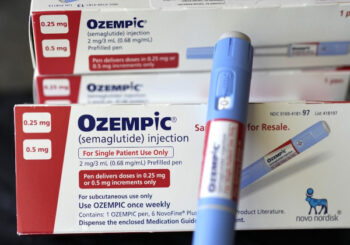Guest Writers for Wake Up World
In a shocking revelation, three drugs – Ozempic, Wegovy, and Saxenda – predominantly used for managing diabetes and weight loss, are currently under the microscope of European Union regulators due to their potential connection to suicidal thoughts and self-harm in patients. These medications, hailed as breakthroughs in the healthcare sector, are raising eyebrows and causing concern among the medical community and patients alike.
The concerns stem from the unsettling reports of suicidal ideation and self-harming behaviors in patients using these drugs. These disturbing findings have resulted in a comprehensive investigation by the European Medicines Agency (EMA), aiming to ascertain whether there is indeed a link between these medications and these alarming adverse effects. The EMA’s probe, initiated on July 3, 2023, is expected to conclude by November of the same year.
The potential implications of this investigation are massive. Not only could it dramatically affect the prescribing habits of physicians worldwide, but it could also lead to severe economic consequences for Novo Nordisk, the pharmaceutical giant manufacturing these medications.
Understanding the Drugs
All three drugs in question are GLP-1 (glucagon-like peptide-1) receptor agonists, a class of drugs utilized for regulating blood sugar in patients with type 2 diabetes and are also known to aid in weight management. Manufactured by Danish pharmaceutical company Novo Nordisk, Ozempic and Wegovy (semaglutide) are once-weekly injections, while Saxenda (liraglutide) is administered daily.
These medications mimic the effects of GLP-1, a hormone that targets areas of the brain regulating appetite and food intake. By stimulating the release of insulin, they help lower blood sugar levels. In addition, they slow down the passage of food through the gut, thereby contributing to weight loss. Despite the weight loss indication being exclusive to Wegovy and Saxenda, some physicians prescribe Ozempic off-label for weight management.
But while these drugs have proven to be quite effective in managing blood sugar levels and promoting weight loss, they are not without side effects. Common side effects include nausea, vomiting, and diarrhea. However, it is the recent reports of more severe side effects, such as suicidal thoughts and self-harming behavior, that are currently garnering attention and prompting further investigation.
The Controversy Unfolds
Despite their significant role in managing diabetes and weight, these drugs are raising grave concerns. The EMA has been investigating Novo Nordisk’s GLP-1 medications following several reports of self-harming thoughts from patients taking Ozempic and Saxenda. What started as an investigation into three cases reported by the Icelandic Medicines Agency has now expanded to encompass a staggering 150 cases.
The EMA’s probe has now been extended to include other GLP-1 receptor agonist medicines, such as Wegovy, and is evaluating about 150 reported instances of potential suicidal ideation and self-injury. This wide-scale investigation comes in response to the gravity of the reported side effects and the large number of patients potentially at risk.
Interestingly, the prescribing information for Saxenda in the U.S. recommends monitoring patients for suicidal thoughts and depression, suggesting discontinuation of use if symptoms appear. Despite containing the same medication, the recommendation is conspicuously absent from Ozempic’s prescribing information, raising further questions.
Case Reports and Clinical Trials: The Red Flags
In a phase three clinical trial of Saxenda, suicidal thoughts emerged as one of the drug’s most severe side effects, apart from other serious adverse effects like renal impairment, pancreatitis, and gallbladder disease. A startling revelation from these trials was the finding that nine out of more than 3,300 people reported suicidal ideation. In addition, one adult attempted suicide, and in pediatric clinical trials, one of 125 studied committed suicide.
Several attempts of suicide using GLP-1 receptor agonists have been reported, with the first known case being a 33-year-old Japanese woman who attempted suicide using liraglutide.
Additionally, an analysis of the U.S. Food and Drug Administration’s Adverse Event Reporting System Public Dashboard revealed 60 reported cases of suicidal ideation and seven suicide attempts from patients taking semaglutide since 2018. Liraglutide recorded even higher instances with 71 cases of suicidal ideation and 28 suicide attempts reported since 2010.
Big Pharma’s Stand
Novo Nordisk, the manufacturer of these medications, has denied claims that their drugs are associated with suicidal thoughts. The company asserts that data from trials and post-surveillance do not indicate a connection between semaglutide and liraglutide and “suicidal and self-harming thoughts.” Novo Nordisk maintains that patient safety is a priority and it takes reports of adverse events very seriously.
However, critics argue that pharmaceutical companies and regulatory agencies are intertwined in a relationship that often prioritizes corporate interests over patients’ safety. They contend that, despite Novo Nordisk’s assurances, the mounting evidence from case reports and the growing list of serious side effects cannot be ignored.
The fact that these are not isolated incidents raises questions about the safety profiles of these drugs. The sheer number of reported cases of suicidal ideation and self-harming behavior suggest that this may not be just a rare side effect, but a systemic issue that requires further investigation.
Regulatory Gaps and the Road Ahead
While the EMA’s investigation is a step in the right direction, critics believe that more needs to be done to ensure patient safety. The seemingly contradictory prescribing information for Saxenda and Ozempic is a testament to gaps in regulation. Some believe the cozy relationship between pharmaceutical companies and regulators has led to a soft approach towards these severe side effects, jeopardizing patient safety.
It is clear that there needs to be more transparency in the way drug manufacturers and regulatory bodies communicate potential risks to patients. The dissonance between the prescribing information for the same class of drugs marketed for different purposes needs to be addressed. If indeed, these drugs pose a risk for suicidal ideation, then all stakeholders must work together to update the labels and disseminate this information to the public and healthcare providers.
While GLP-1 receptor agonists such as Ozempic, Wegovy, and Saxenda may be useful tools in the fight against diabetes and obesity, their potential risks cannot be ignored. As we wait for the results of the EMA’s investigation, the need for regulatory reforms and more transparent and rigorous post-marketing surveillance is evident. At the end of the day, it is about ensuring the well-being and safety of millions of patients who rely on these drugs for their health.
Originally published at The Truth About Cancer and reproduced here with permission.
About the author:
 Ty Bollinger is a health freedom advocate, cancer researcher, former competitive bodybuilder and author. After losing several family members to cancer, he refused to accept the notion that chemotherapy, radiation, and surgery were the most effective treatments available for cancer patients. He began a quest to learn all he possibly could about alternative cancer treatments and the medical industry. What he uncovered was shocking. There is ample evidence to support the allegation that the “war on cancer” is largely a fraud and that multinational pharmaceutical companies are “running the show.” Ty has now made it his life mission to share the most remarkable discovery he made on his quest: the vast majority of all diseases, including cancer, can be easily prevented and even cured without drugs or surgery.
Ty Bollinger is a health freedom advocate, cancer researcher, former competitive bodybuilder and author. After losing several family members to cancer, he refused to accept the notion that chemotherapy, radiation, and surgery were the most effective treatments available for cancer patients. He began a quest to learn all he possibly could about alternative cancer treatments and the medical industry. What he uncovered was shocking. There is ample evidence to support the allegation that the “war on cancer” is largely a fraud and that multinational pharmaceutical companies are “running the show.” Ty has now made it his life mission to share the most remarkable discovery he made on his quest: the vast majority of all diseases, including cancer, can be easily prevented and even cured without drugs or surgery.
For more information, visit:

If you've ever found value in our articles, we'd greatly appreciate your support by purchasing Mindful Meditation Techniques for Kids - A Practical Guide for Adults to Empower Kids with the Gift of Inner Peace and Resilience for Life.
In the spirit of mindfulness, we encourage you to choose the paperback version. Delve into its pages away from screen glare and notifications, allowing yourself to fully immerse in the transformative practices within. The physical book enriches the learning process and serves as a tangible commitment to mindfulness, easily shared among family and friends.
Over the past few years, Wake Up World has faced significant online censorship, impacting our financial ability to stay online. Instead of soliciting donations, we're exploring win-win solutions with our readers to remain financially viable. Moving into book publishing, we hope to secure ongoing funds to continue our mission. With over 8,500 articles published in the past 13 years, we are committed to keeping our content free and accessible to everyone, without resorting to a paywall.








